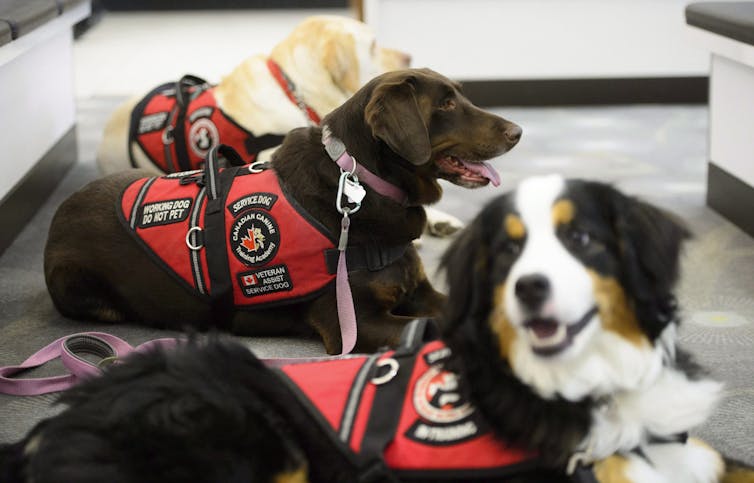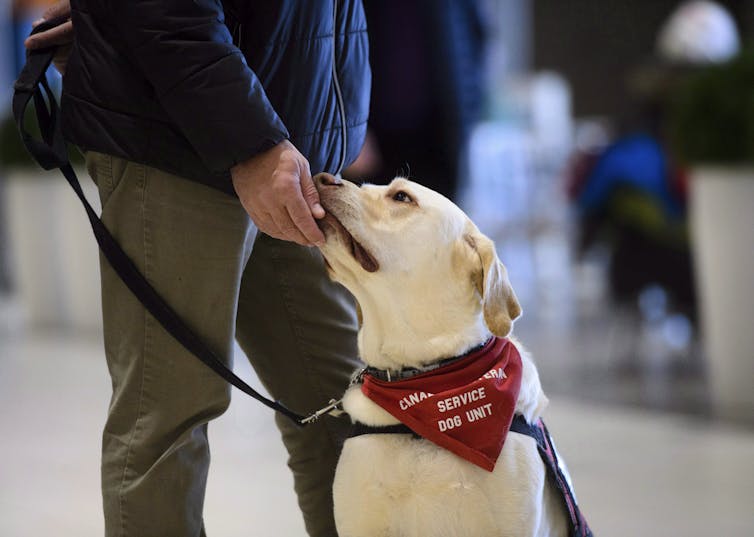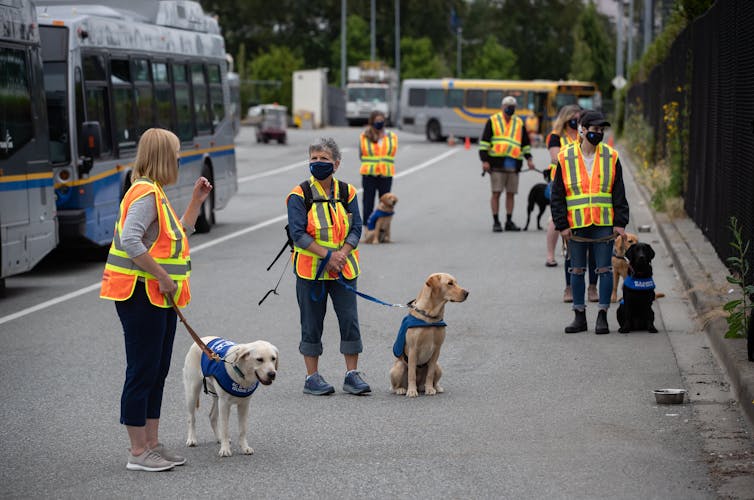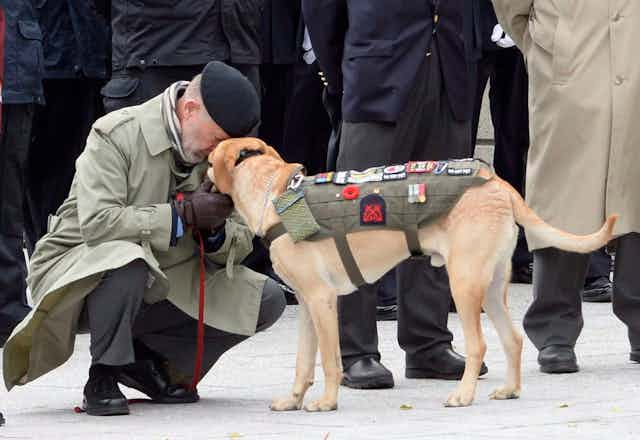It is becoming common to see dogs assisting people with their mental health in Canadian communities. Over the past five years, our research lab has been studying the benefits of service dogs for Canadian veterans dealing with post-traumatic stress injuries and other mental health challenges.
Our findings align with research from the United States and Australia emphasizing the valuable role of service dogs in veterans’ treatment plans. For example, service dogs can wake a veteran from a traumatic nightmare.
This finding also aligns with studies examining the positive effects of owning a pet on mental health. While there is a need for more research, most anyone with a pet in their family can attest to some benefit.
Our research team is not only adding to the growing evidence about the benefits of specific tasks a trained service dog can assist a veteran with, but we are also uncovering the positive impacts of the human-animal bond. The human-animal bond is understood as a mutually beneficial relationship between people and animals.
Approaches to training and standards

In early 2023, our research lab identified nearly 100 service dog training organizations in Canada. The number is likely even higher today. This ranged from not-for-profit organizations that train a person’s pet dog to be a service dog, to for-profit organizations that provide a service dog to a veteran for a fee they are commonly asked to fundraise — this can be upwards of $30,000.
Considering this difference alone, it is easy to see why there is a need for service dog standards in Canada.
Standards are generally agreed upon rules, guidelines or characteristics for activities or their results. Basically, they offer guidance, just like a recipe to make dog biscuits would! An example of a standard for service dogs is requirements for their selection, training, safety and welfare.
Given that there are very different approaches among organizations in how service dogs are trained and matched with veterans, neither the service dog industry nor Canada’s federal, provincial or territorial governments have come to any consensus on what the standards should be.
In fact, in 2017, the Canadian General Standards Board continued a process that was initiated by members of the service dog community in 2013. The aim was to reach a consensus, but it was unsuccessful and may have inadvertently increased confusion and tension in the field. The need for service dog standards was identified at least two decades earlier in Canada.
Impact of lack of standards

The lack of national standards has led provinces and territories to take assorted approaches, if any, to public access for service dogs. This has resulted in numerous challenges for veterans, such as travelling between provinces with their service dogs.
It has prompted businesses and organizations lacking expertise about service dogs to create their own policies. It has also made human rights commissions and tribunals busy with complaints.
The impact of the lack of standards extends beyond its effects on veterans with service dogs. It also affects others matched with service dogs, including first responders and current Canadian Armed Forces members, as well as other forms of service dogs who are trained to assist, like autism service dogs and diabetes alert service dogs.
Taking action to improve veteran health

There may not be consensus in Canada right now about national and/or provincial and territorial service dog standards, but we are confident the field can agree upon one thing — our commitment to improving veteran health.
In the meantime, we propose a shift toward practical approaches that government, service dog organizations and trainers, businesses and members of the general public can take to improve veteran health. These suggestions recognize the value of the human-animal bond.
Role of governments:
Recognize the merits of developing standards through a process that honours the human-animal bond experiences of veterans and service dogs. Consider the guidance offered from the 2023 voluntary process undertaken by the Canadian Foundation for Animal Assisted Support Services to develop a management system for all animal-involved human support services.
Be familiar with the value of accreditation for organizational quality standards. In 2023, two service dog programs, Audeamus Inc. and Courageous Companions Inc., achieved several accreditation standards (for example, Governance & Management) for the first time in Canada through the Canadian Accreditation Council. Both Audeamus and Courageous Companions recognize the bond between a veteran and their service dog.
Accreditation in this case is not to be confused with service dog standards. Accreditation typically reviews an organization’s general structures, programs and practices involving humans against the accrediting body’s standards.
Review the Medical Expense Tax Credit — Service Animals program that applies to veterans and consider the applicability of such a program to pets. Service dogs are specially trained to perform technical tasks well beyond what a pet can. However, recognition of the health benefits of the human-animal bond with pets is likewise important.
The Canadian Transportation Agency can be looked to for guidance with its recent decision on how individuals being treated for a mental disability can travel in an air, rail or ferry passenger cabin with an emotional support animal, and specifically dogs in an approved animal carrier. These passengers are recognized by a mental health professional to have a beneficial emotional connection or bond with their pet.
Role of service dog organizations and trainers:

Service dog trainers embrace a trauma-informed approach to provide services to people with a mental health concern. The online, three-hour Connecting for Veteran Wellness certificate course recognizes the role of trauma and the beneficial influence of the human-animal bond on client health. It is now available at no cost.
Acknowledge the interconnectedness of human and animal welfare by exploring a One Welfare framework to challenge the influence of speciesism, the assumption of human superiority over animals, in the service dog field. This aligns with Indigenous worldviews of the relationship between human, animal and planetary health.
Role of the general public:

Recognize the challenges veterans face when in public with their service dogs, such as being denied access to a business because of stigma or having a stranger ask them to disclose their disability for their own interest by inquiring about the reason they need a service dog.
Be informed about what service dogs do and who they are, including that they can be any breed of dog.
A recent Canadian survey by our research lab found that the Canadian public generally holds positive views of service dogs, with some groups (for example, women) more supportive than others. In this area, Canada is doing well!

